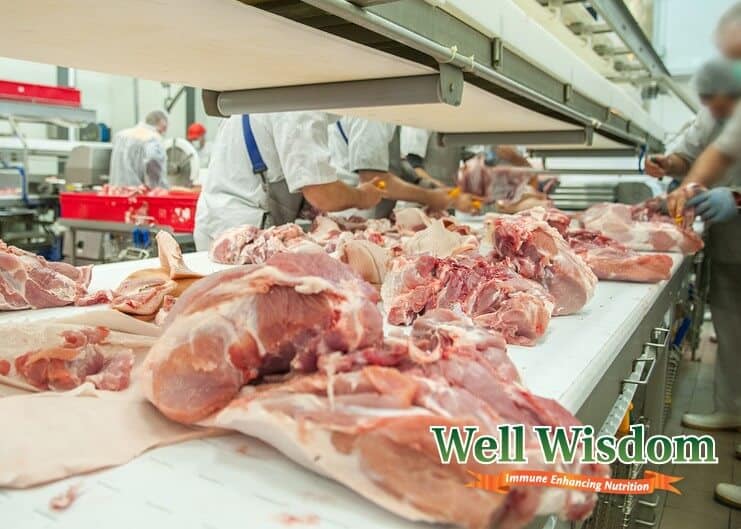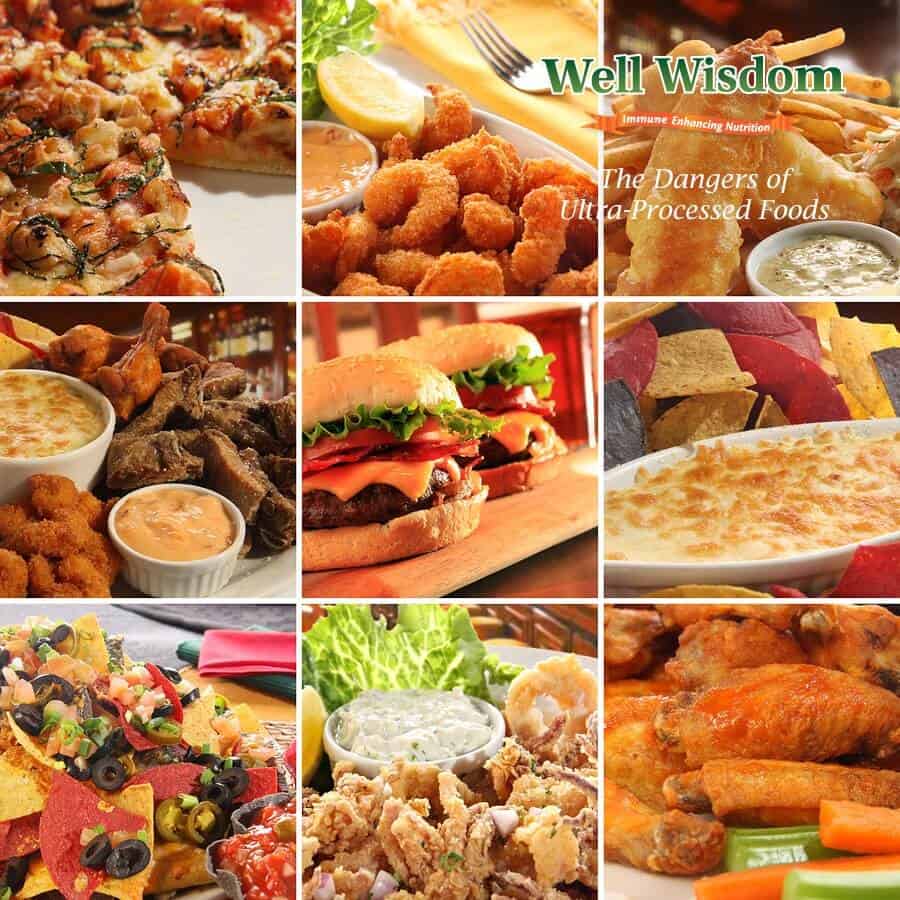
Food processing is one of the most practical means of preventing waste and spoilage of precious, edible resources. It is defined as “transformation of cooked ingredients, by physical or chemical means into food, or of food into other forms. Food processing combines raw food ingredients to produce marketable food products. It can be easily prepared and served by the consumer”
Types of Food Processing Include:
- Mincing
- Macerating
- Liquefaction
- Emulsification
- Boiling
- Broiling
- Frying
- Grilling
- Pickling
- Pasteurization
- Canning
- Packaging
These food processing methods help to keep our food safe for human consumption for longer periods of time. That’s a good thing, right?

Unfortunately, modern food processing has gone beyond the “safe” or “healthy” types of preserving food. Many of the foods we eat today are loaded with chemical preservatives, emulsifiers, surfactants, flavorings, and additives. These “ultra-processed foods” are a lot more dangerous for your consumption than you’d expect!
Want to hear something absolutely terrifying? One study found that roughly 90% of the food consumed by Americans qualifies as “ultra-processed”. The researchers qualified this as “formulations of several ingredients which, besides salt, sugar, oils, and fats. It also includes food substances not used in culinary preparations. In particular, flavors, colors, sweeteners, emulsifiers, and other additives are used to imitate the sensorial qualities of unprocessed or minimally processed foods. And their culinary preparations or to disguise undesirable qualities of the final product.”
According to the research, 57.9% of the average American’s caloric intake comes from foods that fall into this category. That means that close to two-thirds of what we eat is incredibly riddled with chemicals that do not exist in nature—and many of which should not be put into the human body.
The dangers of eating these processed foods are VERY high, and there are a lot more of them than you’d think:
- Excessive sugar intake. Many processed foods contain excessive amounts of sugar—according to the CDC, a staggering 71% of American adults consume more sugar than is recommended, with upwards of 15% of their daily calories coming from “added sugars”.
While sugar is prevalent in many natural foods—including fruits, vegetables, berries, and even grains—excessive amounts of sugar can be very dangerous. High sugar intake can trigger an increase in insulin production (your body’s way of controlling glucose levels). Over time, excessive insulin production can cause your body to become resistant to the appetite hormone. Insulin resistance can often lead to diabetes, one of the leading causes of death in the U.S. today.
- Higher mortality rates. Diabetes is one of the leading causes of death today due to the fact that it strains the cardiovascular system. Diabetics are more likely to develop cardiovascular disease because diabetes can cause high blood pressure, high cholesterol and triglyceride levels, obesity, low physical activity, and medication-induced negative cardiovascular risks. Cardiovascular disease is the #1 killer in the U.S. today, but a lot of those cases are linked to insulin resistance and diabetes—both of which are directly correlated to the excessive amounts of sugar in the ultra-processed food available today.
- Nutritional deficiencies. Have you ever checked the nutritional value of a McDonald’s burger versus a rib-eye steak, or a can of fruit soda versus an actual piece of fruit? Ultra-processed food is delicious, but it’s often vastly deficient in nutrients. Minerals, antioxidants, vitamins, and healthy fatty oils are often destroyed during processing. Nutrient deficiencies are much more common today than ever, thanks to the poor nutritional quality of processed foods.
- Overeating. Some of the chemicals used to make our ultra-processed foods taste good trigger a reaction in the brain, producing “feel good” neurochemicals. We can become addicted to this sensation, craving those foods in order to get that good feeling. The “food = reward/happiness” mindset leads to overeating, which in turn leads to obesity, diabetes, cardiovascular disease, and higher mortality rates.
- Insufficient fiber intake. Fiber is one of the most important nutrients. While it doesn’t fuel your muscles like protein or provide energy like fats or carbs, it is vital for aiding in digestion. Insoluble fiber helps to eliminate waste products from your digestive tract, while soluble fiber absorbs chemicals, sugar, cholesterol, and fats in order to be eliminated. Without enough fiber, our digestive tracts suffer, meaning the beneficial bacteria that account for 80% of our immune activity also suffer.
The truth is that these are just the MAIN dangers of ultra-processed foods. Time and space fail us to get into the ways that these high-sugar, chemical-rich, refined, nutrient-deficient foods affect every part of our bodies: from our brains to our teeth to our stomachs to our liver and kidneys to our bones. These ultra-processed foods are causing damage to our bodies!
The solution is simple: stick with minimally processed foods.
What does that mean?
- As natural as possible. If you can get foods raw and in their natural state, all the better! Fresh fruits and veggies, dried grains and legumes, raw meat—these are all minimally processed foods that are good for eating.
- No added sugar. As long as the food has less than 2% of its calorie content from added sugars, it qualifies as minimally processed.
- No cans, boxes, packages, or plastic wraps. Try to only buy and eat foods that you buy in their proper form. If they’re canned, boxed, packaged, or wrapped in plastic, it’s probably ultra-processed and thus not good for your health.
Here at Well Wisdom, we pride ourselves on only producing minimally processed foods. Our Vital Whey is made with the best quality, natural year-round grass fed cows, and it goes through as few refining processes as possible in order to maintain the proteins, natural sugars, and micronutrients in the milk. We refuse to add extra sugar, but insist on keeping it as “true to source“ as we can. We know the dangers of these ultra-processed foods, and it’s our job to do our part to protect you from them by delivering products that are safe, healthy, and natural.
- Persistent Tiredness and Chronic Fatigue: Causes and Symptoms - February 27, 2024
- Can A Protein Shake Replace A Breakfast Meal? - March 2, 2023
- Glutamine After Surgery: Does It Help With Recovery? - February 17, 2023






So I am doing a report on how to many processed foods can be harmful for your body and was wondering if you could tell me a few ways you can avoid eating so much processed foods??